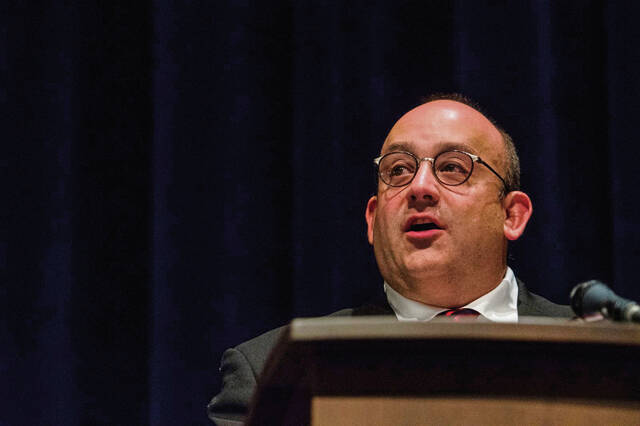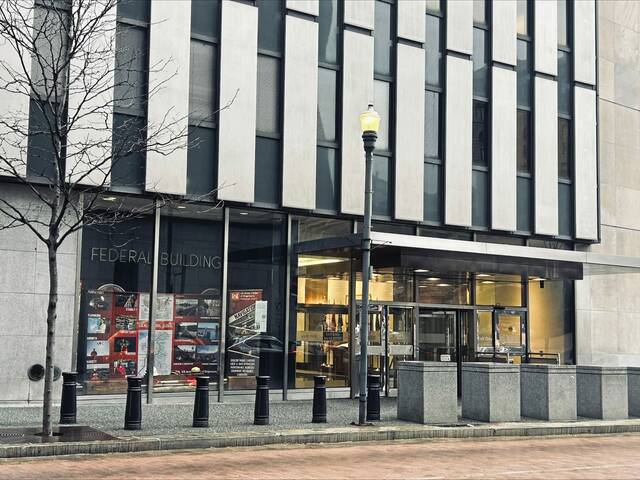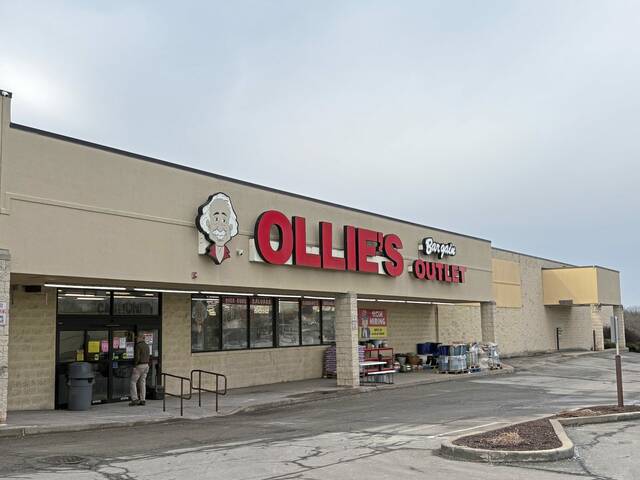Westmoreland’s drug court is in dire need of cash after the county learned this week it lost a grant that pays for weekend testing of participants.
The shortfall could be made up through a 2019 campaign pledge from Doug Chew to donate 60% of his commissioner’s salary to fund drug court. That money, however, is not coming. Chew insisted Friday the program’s needs don’t match what he initially set out to accomplish with his promised donation.
When asked this summer about his promised donation, the first-term Republican maintained the two judges who run the program claimed drug court was at capacity and his offered grant was unnecessary.
The Tribune-Review reviewed dozens of documents requested under the state’s Right-to-Know law that show periodic discussions between Chew and judges Meagan Bilik-DeFazio and Christopher Feliciani about drug court funding. None of the messages directly addressed Chew’s campaign pledge beyond his first reply to a text sent by Bilik-DeFazio in November 2019 in which she congratulated him for his victory. There were no text messages or emails in which the judges said donations were not needed.
Throughout the 2019 campaign, Chew talked about the financial needs of drug court and made his pledge in multiple settings. In a video interview with the Trib in October 2019, Chew again promised to donate a portion of his salary to the drug court.
“In my plan, I would give back 60% of my salary, turning my commissioner’s salary into something that most people in Westmoreland County can relate to. That 60% that I’ll give back to the county, I want to use to increase funding to the drug court,” Chew said.
The judges declined to comment specifically on Chew’s campaign pledge but again said the program was in need of funding.
“We have gaps in funding for sure,” Bilik-DeFazio said. “We have a tremendous need for sober living programs, housing and transportation. Anyone wanting to support the program financially, we can use it.”
Feliciani said the need for additional funding was heightened this week when officials learned a grant to pay for weekend drug testing of program participants was terminated. He said an email was sent to county commissioners Friday seeking money from the county’s budget to continue the drug testing program.
With the grant lost, officials are scrambling to find the $750 needed each week to pay for the testing.
“Never in a million years would we not accept funding,” Feliciani said.
And while drug court is at its maximum capacity, the judge said additional funding is needed to not only keep up the current level of services but to expand the program.
Drug court operates through $390,000 in annual grants to oversee the recovery of up to 60 participants whose struggle with addiction has placed them into the criminal justice system. Participants are monitored by probation staff, recovery specialists and ultimately the two judges who oversee the program. Since the program’s inception in 2015, 52 people have graduated from drug court.
The issue of Chew’s campaign pledge came up this summer when Controller Jeff Balzer questioned the commissioner in a public meeting about his promised donation. Chew said he diverted the donation to other charities, without revealing the amounts, after he was told drug court couldn’t be expanded.
On Friday, he maintained that his offer of cash to expand the program was rejected.
The initial contact between the judges and Chew came in November 2019 after he was elected to the board of commissioners.
“Thank you Madame Judge (Bilik-DeFazio). I was hoping to chat a bit about what drug court needs. Maybe coffee or lunch or just between cases. I plan to donate a portion of my salary to anti-drug needs. Looking forward to working with you as well,” Chew wrote.
A month later, in late December, Chew sent a follow-up text to the judge asking if the county applied for a federal grant to expand the size of drug court. The judge responded with a text message that drug court was at capacity.
“Having said that we only carry a waiting list of 10-12 people at a time and we get people in rather quickly so I’m not sure we have an urgency to expand in the way of adding more participants. We are always learning and looking for ways to improve the program and I do think there are things we can do to improve the quality of the program,” Bilik-DeFazio wrote.
More than a year later, in March, Chew again emailed both judges and asked about drug court funding.
“Now that I’m more familiar with county operations I have more time to seek out grants,” Chew wrote and briefly outlined his involvement in secure funding for housing assistance and an art program.
Both judges responded.
In an email two days later, Bilik-DeFazio said drug court needed funds to pay for a weekend testing program and housing needs for drug court participants. “This is a HUGE need for our participants,” Bilik-DeFazio wrote and suggested Chew meet with drug court officials to discuss funding.
Feliciani wrote back that he agreed with Bilik-DeFazio’s assessment.
As a county commissioner, Chew earns an annual salary of about $81,000. His campaign pledge to donate 60% of his salary to drug court and anti-drug programs would amount to $48,600 each year.
On Friday, Chew responded to questions via text messages and said his campaign pledge was limited to pay for adding more participants to the drug court. During an hourlong meeting this year with drug court staffers, he said they reviewed program needs such as housing and workforce development and that he offered to help find funding.
“My full statements, delivered publicly in 2019 and discussed with addiction support groups, were to help fund the drug court to be able to handle more participants. That was what was on my mail, website, etc. Based on my understanding from sources in 2019, the drug court was underfunded by the commissioners. While that may have been the case when it was formed, it is no longer the case now,” Chew said.
“As I stated before, I continue to donate heavily to Westmoreland County nonprofits, including those that work with addiction disease.”








